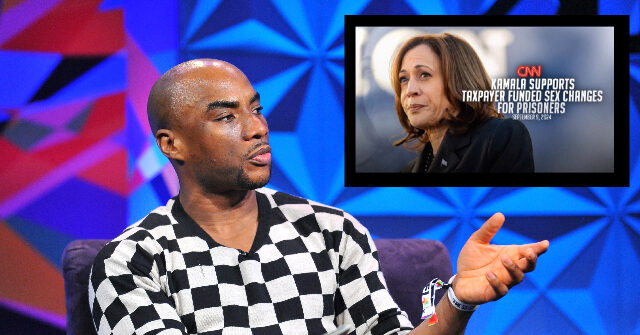A new advertisement from Donald Trump’s campaign prominently features Charlamagne tha God, a renowned radio host, expressing his opposition to taxpayer-funded surgeries for transgender inmates. This ad appears to be strategically targeted at black male voters, a group where Vice President Kamala Harris has struggled to maintain support. Charlamagne’s comments, captured in a recent segment of “The Breakfast Club,” reflect his disapproval of Harris’s past support for such policies. He specifically highlights a Trump ad during a football broadcast that claims Harris endorses funding gender transition surgeries for inmates and migrants, noting its effective delivery and impactful rhetoric.
In the 30-second ad, snippets of Charlamagne’s radio dialogue are used to emphasize his strong objection to the idea that taxpayer money should finance surgeries for transgender individuals in prison. He refers to the ad as “nuts,” and along with co-host DJ Envy, critiques the framing of the message as manipulative yet resonant. Charlamagne’s strong reaction is apparent as he recounts how the ad made him reconsider his position on the issue, stating emphatically, “Hell no, I don’t want my taxpayer dollars going to that.” This reflects a broader sentiment among certain voter demographics that may feel similarly about the use of tax dollars for such healthcare services.
Moreover, this ad not only reinforces Trump’s position but also seeks to cast doubt on Harris’s stance and competence regarding financial appropriations for healthcare in the justice system. Charlamagne acknowledges that the ad’s effectiveness stems from a straightforward presentation of claims that resonate with many viewers. He mentions that upon hearing the phrase about Harris supporting taxpayer-funded sex changes for prisoners, he instinctively felt a need to oppose such policies, which are framed as a misuse of public funds. This approach highlights the strategic manipulation of media narratives in political campaigning.
The origins of Kamala Harris’s position on this issue trace back to 2019 when she responded affirmatively to a campaign questionnaire. Harris indicated her support for taxpayer-funded sex change surgeries within Immigration and Customs Enforcement (ICE) detention centers. Her commitment to ensuring transgender individuals in state care receive necessary treatment aligns with her broader healthcare agenda, which emphasizes access to medical necessities for marginalized populations. Harris stated her belief that gender transition treatments are crucial and should be provided to individuals within the federal prison system.
Additionally, Harris’s stance extends to advocating for medically necessary care for all detainees and prisoners, emphasizing that such procedures are not merely optional but critical healthcare needs. By making these commitments, Harris aligns herself with progressive values to support the LGBTQ+ community. However, political adversaries have sought to leverage her support in this area against her, framing her positions in a way that may alienate certain voter blocs, particularly those who may be less supportive of such funding.
In conclusion, the dynamics at play in this advertisement showcase the intersection of race, gender identity issues, and political strategy. By strategically utilizing Charlamagne’s widely recognized voice, the Trump campaign seeks to sway public opinion among black male voters while simultaneously undercutting Harris’s credibility. This instance exemplifies how media narratives can be crafted to draw clear lines around political figures’ beliefs and policies, influencing voter perceptions and potentially shifting electoral outcomes. As political campaigns evolve, the impact of such targeted messaging will continue to be a critical element in the broader electoral landscape.

